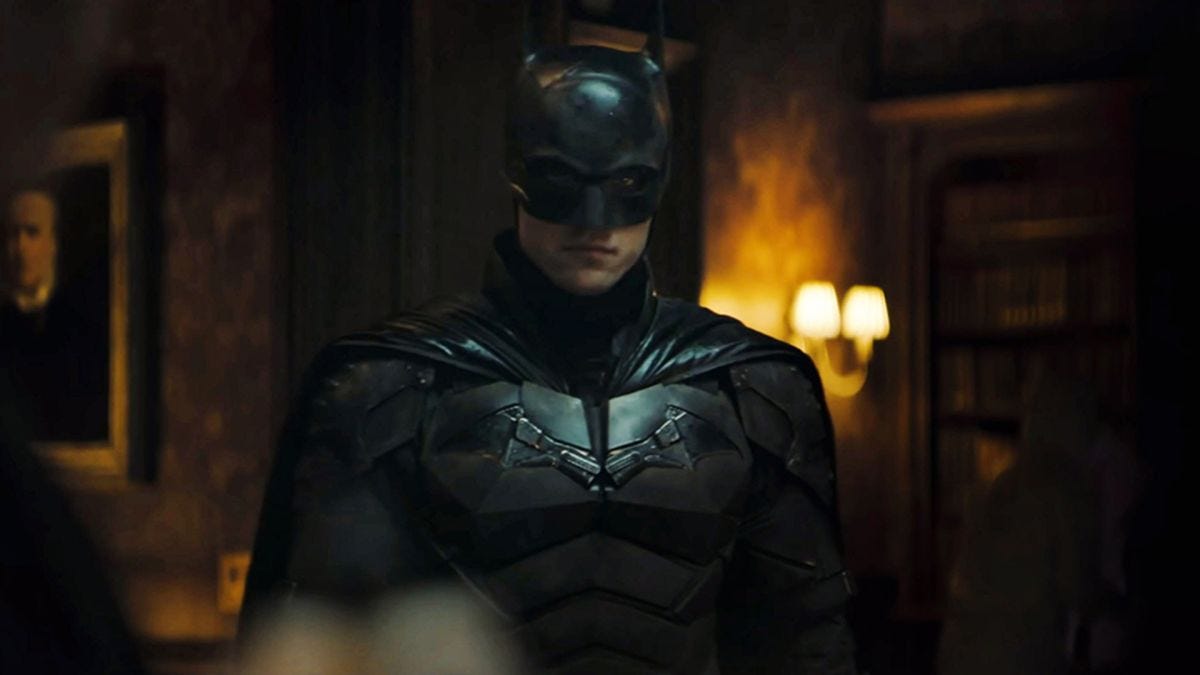Assassinations, ragequits and caped crusaders
Welcome to this week's free newsletter
Welcome to this week’s free edition of The Terminal. Apologies for the lack of posting over the last week — I was hit with an avalanche of work and an illness. Normal programming will now resume. If you’d like to become a paying subscriber, hit the button below.
Dispatches from the grassy knoll
I’m in VICE this week with a retrospective on JFK Reloaded, the controversial 2004 ‘docu-game’ which invited players to replicate the events in Dallas in 1963:
Released on the 41st anniversary of President John F. Kennedy’s assassination, the “docu-game” allowed players to recreate Lee Harvey Oswald’s three gunshots from the window of the Book Depository in Dallas and would ultimately rate them on how closely their actions and movements cohered with the official story as laid out in the Warren Commission’s report and famously captured in the Zapruder film.
To maximise their score, the player’s first shot had to miss its target entirely, the second had to pass through Kennedy’s neck and strike Texas Governor John Connally in the chest, and the third had to fatally wound the President’s head. Any deviation from the official record of events — like by shooting First Lady Jackie Kennedy, or one of the other cars in the motorcade — would incur a points penalty.
The game was partially intended as a repudiation of JFK conspiracy theories, by showing that it was entirely possible for Oswald to take those shots from the window of the Book Depository. Based on some of the responses I’ve gotten, it seems like it had the precise opposite effect for a lot of people — who took the fact that it’s extremely hard to get a perfect score as evidence that it wasn’t possible.
(For subscribers to The Terminal, I published my full interview with developer Kirk Ewing.)
DuckDuckNo
This is interesting:
There have been all sorts of digital boycotts of Russia and Russian companies through the invasion of Ukraine, some reasonable and others absurd, but this one is causing particular stir.
DuckDuckGo, a search engine originally built as a way to preserve user privacy and elude ‘filter bubbles’, has recently found new life for its supposed anti-censorship bona fides. Joe Rogan boosted it on its podcast, and the New York Times reported the anti-vaccine movement liked it because it doesn’t downrank sites questioning the efficacy or safety of the jab.
The DDG community is not happy about this effort to downrank ‘Russian disinformation’, arguing it flies in the face of the site’s commitment to provide unbiased information in response to search queries. Here’s the Reddit right now:
It seems possible the company is rattled by the NYT report and is taking steps to alleviate the perception that it is a platform for conspiracy theorists. From that article:
In a statement, DuckDuckGo said it condemned “acts of disinformation” and said the company’s internal surveys showed that its users had a wide mix of political orientations. The company said it was also studying ways to limit the spread of false and misleading information.
Gone fishing
I’m a huge fan of the broader genre of internet posts from people claiming to have hacked professional life by either a) doing multiple full -ime jobs at once or b) automating their full-time job without their boss’ knowledge, thus claiming a salary for doing nothing. All of them are dubious, but they’re heroes to me.
The batmen
This contains spoilers for The Batman, if you care.
Just as horror movie trends tend to reveal what is troubling the collective human psyche at any given moment, you can generally draw some insights into currents in mass politics from the prevailing interpretation of Batman.
Christophers Nolan’s Dark Knight trilogy is widely interpreted as a polemic against unruly mass politics in general, as well as a justification for the War on Terror. (The scenes in which Batman intercepts Gotham City phone traffic to find Osama bin Joker before nobly turning the system off aren’t particularly subtle.) Nolan, who argued none of his Batman movies are intended to be political, was happy to point to A Tale of Two Cities as inspiration for the third movie, implicitly casting Tom Hardy’s Occupy Wall Street-esque villain Bane as a kind of Robespierre who turns an anti-elite revolution into needless bloodbath and score-settling. The director often gets labelled a right-winger or fascist for his Batman movies, but I think it’s much simpler to interpret them as a standard Hollywood moderate line: by all means reject our sick, sad world, but let’s not throw the baby out with the bathwater – and don’t forget who and what keeps you safe.
Zack Snyder’s movies pick through the pieces of the Tea Party reaction and Trumpism, thinking about civil liberties, nativism, terrorism and the place of American power (as represented by Superman). There’s a suicide bombing and a shot where a protestor is holding a sign describing the Man of Steel as an illegal alien, in case you’d forgotten the sophistication on display in Batman v Superman: Dawn of Justice. Snyder runs into the same problems most Batman directors try to avoid by simply not including Superman at all, which is that material questions about justice and power tend to fade away when one of your characters is a literal alien messiah — which he deals with by elevating it to the level of theology and questions of man vs God. (Mostly incompetently, I might add.)
In both these cases you have ‘auteurs’ openly attempting to reflect contemporary political anxieties through capeshit, which seems like part of the job description when you take on Batman. So I was obviously interested to see what Matt Reeves assumed to be the big questions of the day worth exploring in The Batman.
Reeves started working on the movie in 2017, and you can easily date it to that period in the culture when Catwoman describes the Gotham City elite as being ‘white privileged’. (Hearing that particular phrasing was a genuine blast from the past.) It’s plainly an attempt to make a Batman for the global populist moment — the villains are at either at the corrupt intersection of institutional power and crime, or social media mass shooters as represented by Paul Dano’s Riddler and his psycho Twitch followers. Robert Pattinson’s Batman, partially modelled on Gus Van Sant’s Kurt Cobain pastiche in Last Days, is an anti-playboy cloistered in his absurdly Gothic palace, seemingly ashamed of his wealth and where it came from. He becomes very upset when he learns his murdered parents were connected to the Gotham underworld, and then somewhat reassured when he learns it was for apparently noble reasons.
Of course, a Batman property can never be truly anti-elite, because you can’t dispense with the core premise of a billionaire vigilante who deploys his considerable resources and expertise to dispense justice outside the law. — or, in the now-popular midwit formulation, a rich guy who beats up poor people instead of funding mental health services. Reeves runs with that contradiction so hard that he comes out the other end seeming like he doesn’t really like the character much at all.
But it’s interesting that this does feel like the natural way to look at Bruce Wayne, given current political currents. From Nolan’s unapologetically anti-popular Batman, who surveils and disciplines a society out of some sense of noblesse oblige, to Reeves’ sad Batman who bristles at his social position and faces down a sprawlingly corrupt system, it’s all a fascinating journey to where these directors think the puck is going.
Reality bites
Thought this was funny from Valve Software founder Gabe Newell on the recent gold rush to the metaverse:
There's a bunch of get rich quick schemes around metaverse… Most of the people who are talking about metaverse have absolutely no idea what they're talking about. And they've apparently never played an MMO. They're like, 'Oh, you'll have this customisable avatar.' And it's like, well... go into La Noscea in Final Fantasy 14 and tell me that this isn't a solved problem from a decade ago, not some fabulous thing that you're, you know, inventing.
I'm friends with [Snow Crash author] Neal Stephenson, and every time we get together, he just puts his face in his hands. So it's like, 'Okay, what metaverse story is driving you insane today?'
Army of the dead
Read this last month but didn’t share it. Ryan Broderick at Garbage Day was trying to find some objective basis to the popular theory that Twitter was ruined by the incursion of Tumblr’s most annoying users, who fled the platform after its 2018 ban on porn.
According to data from that time period, about 150 million users left Tumblr at the end of 2018. During the same winter, Twitter was actually losing followers, but, by the spring, had gained about 10 million users. So, in a sense, you can say that, yes, Twitter grew after Tumblr’s porn ban. Though, there’s no real way to prove that it was specifically Tumblr users who migrated to Twitter. The Trump presidency made Twitter the center of the universe for a while, so it’s understandable that the user base would grow at that time. But since doing that research, I have wondered if the bulk of community moderation problems on major social networks is actually about managing the toxic behavior of the same 5-10 million people who move around the web being terrible to each other. And, for what’s it’s worth, I do know one truly horrible Tumblr user who was an active fandom bully on that site who is now doing the same stuff on Twitter.
I don’t know if that’s actually the case, but you have to admit there’s something intrinsically appealing about the idea of a loosely disciplined army of insufferable dorks with no social skills moving across the internet, leaving a trail of destruction and cancellations in their wake.
Lounging
From the ‘Y2K Aesthetic Institute’, a Twitter account that curates “late 90s-2003 futurism”:
Imagining Sisyphus happy
Elden Ring was released at the end of last month, and has quickly become one of the best-reviewed games of all time, along with one of the most streamed on Twitch. The latest from Japanese developer FromSoftware and director Hidetaka Miyazaki — who I think is one of the most interesting people working in any artistic medium — it continues on the foundations laid by the Dark Souls series: beautiful visual design, minimalist storytelling, simple but responsive controls, and absolutely uncompromising difficulty.
That last point has led to some interesting discourse online over the past couple of weeks. FromSoftware titles reject the prevailing design ethos of most popular games by rewarding patience and pattern recognition, and subjecting players to a lot of extremely brutal and frustrating deaths. Failing repeatedly due to minor errors is part and parcel of the gameplay loop — and the genuine adrenaline rush when you finally do win is basically unmatched outside of sport. (Dark Souls players often talk about feeling like they could lift a car or run through a brick wall when they beat a particularly difficult boss.)
Now that gaming is a mass medium that has infiltrated the culture more broadly, most popular games with broad appeal shy away from extreme difficulty, or at least provide players with the option to make it easier if they so wish. It doesn’t make a lot of commercial sense to lock potential customers out, after all. Elden Ring, despite being as widely discussed on social media as many popular TV shows and movies, is extremely tough, and many players aren’t even able to get past the very first major enemy.
None of this is particularly alien to the average Dark Souls player, but this is a game that has seen the biggest non-FIFA or Call of Duty launch since Red Dead Redemption 2 in the UK. The game was marketed as a mainstream cultural product from the beginning — it was made in collaboration with George R.R. Martin, after all1. But, as many are finding out, it’s not really a game that most people can switch on and zone out to. The difficulty can be overstated, but it does require a certain level of commitment. “I do feel apologetic toward anyone who feels there’s just too much to overcome in my games,” Miyazaki told the New Yorker at the game’s launch. “I just want as many players as possible to experience the joy that comes from overcoming hardship.”
Anyway, this has led to warring tribes on social media, between those who think the game is poorly designed or inaccessible because of its difficulty level, and those who disagree, including some who make possibly overdramatic arguments like “would you tell JAMES JOYCE to make ULYSSES easier?”
Either way, I think it’s a genuinely fascinating artefact — a cultural product that is both extremely popular and so difficult that many people who bought it aren’t going to experience even 10% of it. It’s a repudiation of some widely held design principles for mainstream games, sure, but it’s also unusual to see in any kind of art or pop culture with this level of popularity.
Elsewhere
There’s been plenty of discussion about SWIFT due to sanctions on Russia, and this was a good bit on how it actually works.
Similarly, thought this was good on crypto and the Ukrainian invasion — particularly this concept of the ‘right to transact’ which I mentioned in a newsletter the other week.
Excellent from Richard Cooke at The Monthly on NFTs, AI and art.
Good investigation on perennial crypto guy Justin Sun.
‘How Peter Thiel Backed An “Anti-Woke” Film Festival’ — great piece, and a good insight into Thiel’s particular heterodoxy when it comes to what he funds.
A dispatch from Donald Trump’s Twitter competitor, Truth Social.
Good one from culture zine Blackbird Spyplane on ‘Un-Grammable Hang Zones’ — increasingly lost social spaces that have not been relentlessly optimised for mass distribution on social media.
Oldie but a goodie: The Odd Story Behind One of Wikipedia’s Oddest Images”.
Having played a bit of it, it’s hard to tell what GRRM actually contributed. It feels like a Dark Souls game through and through. (He downplayed his contribution in a recent blog post.)










